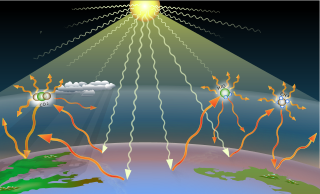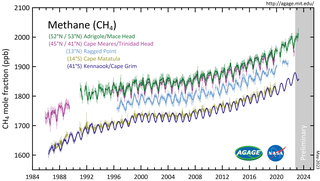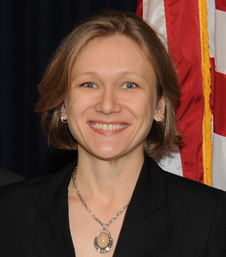Related Research Articles

Global Warming Potential (GWP) is an index to measure of how much infrared thermal radiation a greenhouse gas would absorb over a given time frame after it has been added to the atmosphere. The GWP makes different greenhouse gases comparable with regards to their "effectiveness in causing radiative forcing". It is expressed as a multiple of the radiation that would be absorbed by the same mass of added carbon dioxide, which is taken as a reference gas. Therefore, the GWP is one for CO2. For other gases it depends on how strongly the gas absorbs infrared thermal radiation, how quickly the gas leaves the atmosphere, and the time frame being considered.

Chlorofluorocarbons (CFCs) and hydrochlorofluorocarbons (HCFCs) are fully or partly halogenated hydrocarbons that contain carbon (C), hydrogen (H), chlorine (Cl), and fluorine (F), produced as volatile derivatives of methane, ethane, and propane.
Methanogenesis or biomethanation is the formation of methane coupled to energy conservation by microbes known as methanogens. Organisms capable of producing methane for energy conservation have been identified only from the domain Archaea, a group phylogenetically distinct from both eukaryotes and bacteria, although many live in close association with anaerobic bacteria. The production of methane is an important and widespread form of microbial metabolism. In anoxic environments, it is the final step in the decomposition of biomass. Methanogenesis is responsible for significant amounts of natural gas accumulations, the remainder being thermogenic.
Michael Brendan McElroy is the Gilbert Butler Professor of Environmental Studies at Harvard University. His research initially revolved around the origin and evolution of the planets to an emphasis on effects of human activity on the global environment of the Earth, especially climate change.
Mohammad Aslam Khan Khalil, M.A.K. Khalil or Aslam Khalil is a theoretical physicist known for his leading research in atmospheric physics. Early in his career, he worked on quantum field theory of elementary particles. During the last three decades, he has worked on Global Change Science, including the physics, chemistry and biology of greenhouse gases and ozone depleting compounds. He is a professor of physics at Portland State University.

Methane is a chemical compound with the chemical formula CH4. It is a group-14 hydride, the simplest alkane, and the main constituent of natural gas. The abundance of methane on Earth makes it an economically attractive fuel, although capturing and storing it is hard because it is a gas at standard temperature and pressure.

Arctic methane release is the release of methane from Arctic ocean waters as well as from soils in permafrost regions of the Arctic. While it is a long-term natural process, methane release is exacerbated by global warming. This results in a positive climate change feedback, as methane is a powerful greenhouse gas. The Arctic region is one of many natural sources of methane. Climate change could accelerate methane release in the Arctic, due to the release of methane from existing stores, and from methanogenesis in rotting biomass. When permafrost thaws as a consequence of warming, large amounts of organic material can become available for methanogenesis and may ultimately be released as methane.
Joseph S. Francisco is an American scientist and the former president of the American Chemical Society from 2009 to 2010. He currently serves as the President's Distinguished Professor of Earth and Environmental Science and professor of chemistry at the University of Pennsylvania. He was the Dean of the College of Arts and Sciences, and held the Elmer H. and Ruby M. Cordes Chair in chemistry at the University of Nebraska in Lincoln until 2018.

Greenhouse gases are the gases in the atmosphere that raise the surface temperature of planets such as the Earth. What distinguishes them from other gases is that they absorb the wavelengths of radiation that a planet emits, resulting in the greenhouse effect. The Earth is warmed by sunlight, causing its surface to radiate heat, which is then mostly absorbed by greenhouse gases. Without greenhouse gases in the atmosphere, the average temperature of Earth's surface would be about −18 °C (0 °F), rather than the present average of 15 °C (59 °F).

Atmospheric methane is the methane present in Earth's atmosphere. The concentration of atmospheric methane is increasing due to methane emissions, and is causing climate change. Methane is one of the most potent greenhouse gases. Methane's radiative forcing (RF) of climate is direct, and it is the second largest contributor to human-caused climate forcing in the historical period. Methane is a major source of water vapour in the stratosphere through oxidation; and water vapour adds about 15% to methane's radiative forcing effect. The global warming potential (GWP) for methane is about 84 in terms of its impact over a 20-year timeframe, and 28 in terms of its impact over a 100-year timeframe.

Manure management refers to capture, storage, treatment, and utilization of animal manures in an environmentally sustainable manner. It can be retained in various holding facilities. Animal manure can occur in a liquid, slurry, or solid form. It is utilized by distribution on fields in amounts that enrich soils without causing water pollution or unacceptably high levels of nutrient enrichment. Manure management is a component of nutrient management.

Warren Morton Washington is an American atmospheric scientist, a former chair of the National Science Board, and currently a Distinguished Scholar at the National Center for Atmospheric Research (NCAR) in Boulder, Colorado.
Paul O. Wennberg is the R. Stanton Avery Professor of Atmospheric Chemistry and Environmental Science and Engineering at the California Institute of Technology (Caltech). He is the director of the Ronald and Maxine Linde Center for Global Environmental Science. He is chair of the Total Carbon Column Observing Network and a founding member of the Orbiting Carbon Observatory project, which created NASA's first spacecraft for analysis of carbon dioxide in the atmosphere. He is also the principal investigator for the Mars Atmospheric Trace Molecule Occultation Spectrometer (MATMOS) to investigate trace gases in Mars's atmosphere.

The atmospheric carbon cycle accounts for the exchange of gaseous carbon compounds, primarily carbon dioxide, between Earth's atmosphere, the oceans, and the terrestrial biosphere. It is one of the faster components of the planet's overall carbon cycle, supporting the exchange of more than 200 billion tons of carbon in and out of the atmosphere throughout the course of each year. Atmospheric concentrations of CO2 remain stable over longer timescales only when there exists a balance between these two flows. Methane, Carbon monoxide (CO), and other man-made compounds are present in smaller concentrations and are also part of the atmospheric carbon cycle.
Increasing methane emissions are a major contributor to the rising concentration of greenhouse gases in Earth's atmosphere, and are responsible for up to one-third of near-term global heating. During 2019, about 60% of methane released globally was from human activities, while natural sources contributed about 40%. Reducing methane emissions by capturing and utilizing the gas can produce simultaneous environmental and economic benefits.

Gas venting, more specifically known as natural-gas venting or methane venting, is the intentional and controlled release of gases containing alkane hydrocarbons - predominately methane - into Earth's atmosphere. It is a widely used method for disposal of unwanted gases which are produced during the extraction of coal and crude oil. Such gases may lack value when they are not recyclable into the production process, have no export route to consumer markets, or are surplus to near-term demand. In cases where the gases have value to the producer, substantial amounts may also be vented from the equipment used for gas collection, transport, and distribution.
Donald Ira Siegel is the emeritus Laura J. and L. Douglas Meredith Professor in the department of Earth Science at Syracuse University. He served as the president of the Geological Society of America from July 2019 until June 2020. Siegel is known for his work in wetland geochemistry and hydrogeology.
Jennifer Logan is an atmospheric scientist known for her research on how human activities influence the atmosphere, particularly with respect to biomass burning and the ozone hole.

Anna Michalak is an American geophysicist who is Director of the Department of Global Ecology at the Carnegie Institution for Science and a professor at Stanford University. Her research considers the cycling and emission of greenhouse gases. She is the lead author of the carbon cycle science plan, a comprehensive analysis of Earth's carbon stocks and flows. She was awarded the 2021 American Geophysical Union Joanne Simpson Medal.
Chris Greening is a biochemist, microbiologist, and academic. He is a Professor of Microbiology and leads the One Health Microbiology group and Global Change Research Program of the Biomedicine Discovery Institute at Monash University in Melbourne, Australia. He is most known for his work on the basis, role, and significance of the microbial metabolism of trace gases such as hydrogen, methane, carbon monoxide, and carbon dioxide. He has held prestigious fellowships from the CSIRO (2014-2016), Australian Research Council (2017-2019), and National Health and Medical Research Council (2020-2024) and was awarded the Fenner Medal 2022 from the Australian Academy of Science. Greening was awarded the Prime Minister's Prize for Life Scientist of the Year in 2023.
References
- ↑ "Steven Wofsy". aaas.org. Retrieved April 25, 2017.
- ↑ https://www.nasonline.org/member-directory/members/48990.html
- ↑ https://www.volts.wtf/p/whats-the-deal-with-these-methane